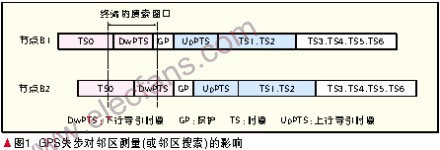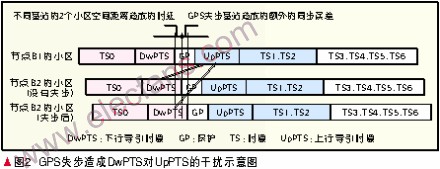Effect of GPS synchronization failure in TD-SCDMA network
(1) GPS signal received interference from outside
The GPS operating frequency band is 1 575 MHz. Since the GPS signal is very weak after it is transmitted from the satellite to the ground, it is easily affected by external interference. Many factors will cause interference to the GPS signal, such as the interference of the solar flares in outer space and the ionosphere. Interference with the atmospheric environment, the impact of abnormal weather such as lightning. In the presence of interference, the signal quality of the satellite received by the receiver will deteriorate, the signal-to-noise ratio will decrease, and the bit error rate will increase, sometimes resulting in the failure to receive satellite signals.
(2) Construction reasons
When building a large-scale station in reality, if there are obstructions near the GPS antenna installation location or construction process problems cause the feeder impedance to be too large, the feeder head process is defective, and the feeder enters the water and other factors, the GPS signal received by the base station side is weak.
Long-term synchronization failure will cause timing deviation between base stations. Excessive timing deviation will affect cell phone neighbor cell search, cell handover, downlink pilot time slot (DwPTS) interference to uplink pilot time slot (UpPTS) and service time slot cross. These will further affect the quality of the network, resulting in handover failures, dropped calls, and a drop in call-through rate, which will seriously affect the user experience in the network. To this end, we test the impact of base station timing deviation due to GPS out-of-step on network performance and quality, to determine the GPS out-of-step timing deviation that the TD-SCDMA system can tolerate, and further provide options for alternative GPS synchronization systems in accordance with.
1 Theoretical analysis
GPS out-of-synchronization causes excessive GPS timing deviation between base stations. From the analysis of TD-SCDMA frame structure, terminal and system implementation, GPS out-of-synchronization mainly affects the system in three aspects.
(1) Neighbor cell measurement (or neighbor cell search) related to handover and cell reselection
In the normal state, the user terminal (UE) needs to perform the neighbor cell DwPTS search based on the current cell DwPTS timing. If the neighbor cell timing deviation is too large, the UE cannot search for the neighbor cell DwPTS in the DwPTS search window. Or even if the neighboring cell can be searched, the main common control channel (PCCPCH) signal of the neighboring cell is poor, and the signal-to-interference ratio (SIR) is low, which seriously affects the performance of the network's key parameter index (KPI), causing terminal reselection and switching The problem is shown in Figure 1.

In addition, the relay handover in TD-SCDMA reduces the terminal UpPTS access process, speeds up the handover process, and increases the success rate of handover. However, the synchronization requirements between base stations are relatively high. Therefore, once the GPS between the base stations loses synchronization, the terminal is The synchronization on the dedicated channel is not synchronized (the terminal sends special burst data on the dedicated channel, and the base station confirms after receiving it, indicating that the uplink synchronization is successful, and then the base station sends special burst data, and the terminal receives, indicating that the downlink synchronization is successful). It is easy to fail.
(2) DwPTS interference to UpPTS time slot
In order to avoid the interference of downlink DwPTS to UpPTS between cells in TD-SCDMA, a 96-chip protection (GP) time slot is reserved between the two time slots. In the case of GPS out-of-synchronization, the effective protection time between the DwPTS time slot and the UpPTS time slot will be reduced. as shown in picture 2.

The increase of UpPTS time slot interference will cause the coverage shrinkage of the upstream UpPTS channel (in the TD-SCDMA system, the coverage of the 64k videophone service (CS64k) in the circuit-switched domain is minimal, so the coverage of the UpPTS service channel must be at least the same as that of CS64k Coverage), which affects the uplink access of single-cell edge users, but in the actual network, the area where the PCCPCH received signal code power (RSCP) is less than -95 dBm is very small, so the impact on the call rate is relatively small .
(3) Cross-interference of service time slots
TD-CDMA system has a 16 chip at the end of each time slot

In TD-SCDMA, each service time slot has a length of 864 chips, so the cross-slot caused by GPS out-of-synchronization will only interfere with some chip periods during the service time slot, and it will only cause significant interference when GPS out-of-synchronization is large .
2 Test design
In order to quantitatively analyze the impact of GPS out-of-step on network performance and quality, we conduct test verification in a real network environment.
(1) Selection of test environment
Select a high site in the real network, load the base station software that can set the GPS out-of-synchronization, causing artificial GPS out-of-synchronization, the GPS out-of-synchronization timing deviation can be controlled and modified, and there are 1 to 2 circles of base station GPS synchronization around it. Cover 30 to 40 contiguous cells.
(2) Test terminal selection
The software uses Dingli road test software, the drive test terminal uses two ZTE U85 and one Datang 8120, and supports videophone.
(3) Provisions for simulated loading in the test
Cell simulation loading regulations: 75% simulation loading, that is, loading 75% of the code channels in a single slot, and the power is 27 dBm.
(4) Design of test cases
According to the above theoretical analysis, a total of 8 test cases were designed.
(a) Base station GPS timing forward deviation
The FirstPower High Temperature Battery is desgined for apllcation as extreme temperatures version. This series is specifically for application where robust battery performance is required to withstand harsh temperature environment.
We welcome orders with "FirstPower" brand; We are also flexible to accept orders on OEM basis. Contact us now! Your partnership with FirstPower will prove worthy of it.
High Temperature Battery
High Temperature Battery,High Temperature Solar Battery,High Temperature Gel Battery,High Temperature Long Life Battery
Firstpower Tech. Co., Ltd. , https://www.firstpowersales.com